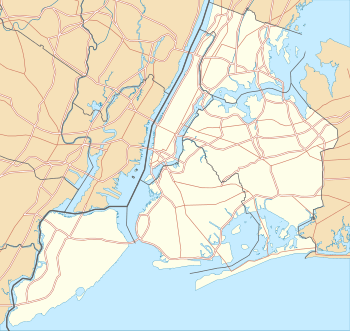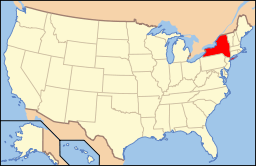Bartow-Pell Mansion
|
Bartow-Pell Mansion and Carriage House | |
|
NYC Landmark #LP-0125 | |
 | |
   | |
| Location | 895 Shore Road North, Pelham Bay Park, Bronx, New York |
|---|---|
| Coordinates | 40°52′17.8″N 73°48′21.4″W / 40.871611°N 73.805944°WCoordinates: 40°52′17.8″N 73°48′21.4″W / 40.871611°N 73.805944°W |
| Built | 1836 |
| Architectural style | Greek Revival |
| NRHP Reference # | 74001220 |
| NYCL # | LP-0125 |
| Significant dates | |
| Added to NRHP | December 30, 1974[1] |
| Designated NHL | December 8, 1976[2] |
| Designated NYCL | February 15, 1966 |
The Bartow-Pell Mansion is a landmark and museum located in the northern portion of Pelham Bay Park in the Bronx, New York City.
History
Originally the Robert and Marie Lorillard Bartow House, the residence and estate date back to 1654. The Lords of the Manor of Pelham once owned the home which was later enlarged, renovated and remodeled in the Federal style. The current house was built between 1836 and 1842. Ownership of the house passed between the Bartow and Pell families until it was finally sold to the City of New York in 1888 by descendants of the Bartow family.[3]
The mansion remained unused and empty for years before being leased by the City of New York to Mrs. Zelia Hoffman in 1914 to house the International Garden Club, Inc., an organization she had founded to promote formal gardens. The club has since extended its purpose to include the preservation and restoration of the home.[4] The exterior of the mansion was restored and the formal gardens were constructed from 1914 to 1917.[5][6] In 1936, Mayor Fiorello La Guardia used the mansion as his summer residence while nearby Orchard Beach was built. The interior of the mansion, furnished with period antiques, reopened to the public as a museum in 1946. The property also includes the Pell family burial plot.
The property was designated a National Historic Landmark in 1978.[2][7] The mansion and a carriage house are included. Since 2008, Adventures in Preservation has been helping to preserve Bartow-Pell Mansion, a project that has been partly funded by a grant from the Cynthia Woods Mitchell Fund for Historic Interiors of the National Trust for Historic Preservation.[8]
References
- ↑ National Park Service (2007-01-23). "National Register Information System". National Register of Historic Places. National Park Service.
- 1 2 "Bartow-Pell Mansion". National Historic Landmark summary listing. National Park Service. 2007-09-08. Archived from the original on 2007-10-13.
- ↑ Chronological history of Bartow-Pell Mansion
- ↑ About Mrs Charles Frederick Hoffman
- ↑ "GARDEN CLUB ENJOINS CITY", "New York Times", July 9, 1918, Page 24
- ↑ Constitution and By-Laws of the International Garden Club, 1915
- ↑ Carolyn Pitts (August 4, 1997). "National Register of Historic Places Inventory-Nomination: Bartow-Pell Mansion Museum" (PDF). National Park Service.
- ↑ Adventures in Preservation - Shutter Shop on Shore Road
External links
 Media related to Bartow-Pell Mansion at Wikimedia Commons
Media related to Bartow-Pell Mansion at Wikimedia Commons- Official website
- Historic American Buildings Survey (HABS) No. NY-456, "Bartow-Pell Mansion, Shore Road, Pelham Bay Park, Bronx, Bronx County, NY", 18 photos, 10 measured drawings, supplemental material
- HABS No. NY-456-A, "Bartow-Pell Mansion, Carriage House", 1 measured drawing

